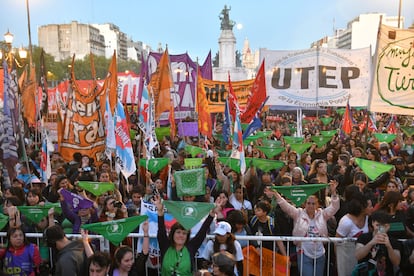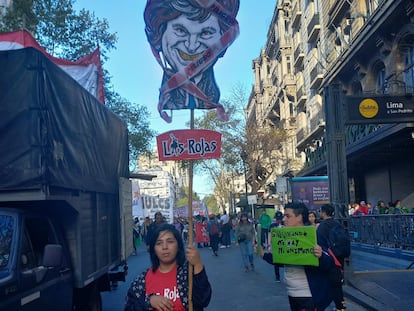Argentina’s feminist movement mobilizes against Javier Milei
Thousands of people took to the streets to protest the far-right leader, who has promised to repeal the right to abortion, eliminate the Ministry of Women and restrict sex education

After years of internal divisions, Argentina’s feminist movement has found a common enemy to unite against: Javier Milei. The far-right presidential candidate, who is leading in the polls ahead of the general elections on October 22, has promised to eliminate the Ministry of Women, repeal the 2020 law that legalized abortion and to put an end to other rights won by women. In response, thousands of people in different cities across the country took to the streets on Thursday to make it clear that they will fight for their rights.
In Buenos Aires, the capital, demonstrators waved signs with messages such as “If Milei wins, we all lose,” “With Milei, women’s rights do not advance, they go backwards,” and “Freedom is being able to choose whether you want to be a mother or not.”
The march — the largest women’s demonstration since the end of the pandemic — was called to mark International Safe Abortion Day, which is celebrated every year on September 28.

“It cost us so much to get the abortion law, and we continued fighting after it was approved,” said Agustina Seggiaro, 22, a member of the Radical Civic Union, one of the parties that makes up the center-right coalition Together for Change. “Milei’s party wants to get this off the agenda. This is a historic moment where they want to violate our rights again. It is important to be on the street,” she added.
“We are marching for legal abortion,” said Dora Barranco, an iconic figure in Argentina’s women’s movement. “There are places where they ask us if it is the law, where they do not know that it is safe, that it is free. They are afraid and don’t know where to turn,” she said.
In addition to reproductive rights, the protesters also defended the 2006 law which recognizes students’ right to a comprehensive sex education. Milei, who is the leader of the Libertad Avanza (Freedom Advances) party, has attacked the law, arguing that sex education should not be mandatory at school.
“The contents are written by specialists. We do not teach anything, nor do we indoctrinate or teach them to be gay or trans. We teach them that there is not only one way, the heteronormative one,” explained Bárbara Riveros, who runs a course in sex education. “It’s very dangerous that they can repeal the law.”
“Today we have come out not only because the rights we have achieved are in danger, but also because labor laws, public health and public education are at risk. It is essential that women in the country take to the streets,” added Nina Burga, 79, another iconic figure in Argentina’s women’s movement.
One of the signs at the march read: “Freedom is 80% of children who suffered abuse being able to tell others about it thanks to comprehensive sexual education.”

Dozens of organizations signed a “unitary” document that was read in front of the Argentine Congress. It demanded sex education and safe access to abortion and contraceptives, and denounced the right faction that “targets the feminist and LGTBQI+ movement.”
“We are taking to the streets because we know that this is our space for struggle, for what we have achieved and for what we have left to achieve, because we will not take a single step back,” the statement said.
Legislative advances
The most recent wave of feminism broke out in Argentina on June 3, 2015, under the slogan “Ni Una Menos” or “Not One Less.” Hundreds of thousands of women of all ideologies and ages took to the streets to demand measures to combat femicides and greater gender equality. In 2017, Congress approved the gender parity law, which establishes that lists of candidates for lawmakers must include men and women. In 2018, Buenos Aires approved a law against street harassment. And tn 2019, Micaela law — which required gender perspective training for all employees in the public service — was passed.
Official records of femicides also began to be published, more resources were allocated to combat violence against women and after actress Thelma Fardín accused actor Juan Darthés of rape, thousands of women came out to share their own experiences of sexual abuse.
After being defeated in Congress in 2018, the Voluntary Interruption of Pregnancy Law (IVE) was approved on the penultimate day of 2020, in the middle of the pandemic. The law legalized abortion during the first 14 weeks of pregnancy. After that point, it can be performed, but only in the case of rape, risk of life or health to the woman, or risk of stillbirth.
Outside Congress, the news was met by a divided square of demonstrators. On the one side, thousands of women were jubilant, shouting and hugging each other in celebration. On the other, anti-abortion advocates cried with anger and warned they would do everything possible to repeal the new law.

Milei has gained the support of these anti-abortionists, as he is the only presidential candidate who has explicitly campaigned in favor of repealing the 2020 law. What’s more the far-right candidate is also backed by young men, who feel disoriented by the rapid change of social rules.
“I’m not going to apologize for having a penis,” Milei said in a public interview. “I have no reason to feel ashamed of being a blond, blue-eyed white man,” he added.
Argentina’s feminist movement, however, is not backing down either.
Sign up for our weekly newsletter to get more English-language news coverage from EL PAÍS USA Edition
Tu suscripción se está usando en otro dispositivo
¿Quieres añadir otro usuario a tu suscripción?
Si continúas leyendo en este dispositivo, no se podrá leer en el otro.
FlechaTu suscripción se está usando en otro dispositivo y solo puedes acceder a EL PAÍS desde un dispositivo a la vez.
Si quieres compartir tu cuenta, cambia tu suscripción a la modalidad Premium, así podrás añadir otro usuario. Cada uno accederá con su propia cuenta de email, lo que os permitirá personalizar vuestra experiencia en EL PAÍS.
¿Tienes una suscripción de empresa? Accede aquí para contratar más cuentas.
En el caso de no saber quién está usando tu cuenta, te recomendamos cambiar tu contraseña aquí.
Si decides continuar compartiendo tu cuenta, este mensaje se mostrará en tu dispositivo y en el de la otra persona que está usando tu cuenta de forma indefinida, afectando a tu experiencia de lectura. Puedes consultar aquí los términos y condiciones de la suscripción digital.








































